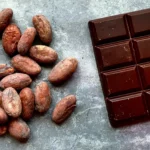Prepare to embark on an enthralling journey through time as we delve into the enigmatic history of cocoa. From its humble origins in ancient civilizations to its profound impact on global trade and culture, cocoa’s story is a captivating blend of history, economics, sustainability, phytochemicals, and cutting-edge research. Discover how this remarkable bean has shaped our world and continues to influence our lives in myriad ways.
Key Takeaways:
- Cocoa was first domesticated in equatorial South America an impressive 5,300 years ago.
- The Olmecs introduced cocoa to Central America, and pre-Hispanic cultures along the Yucatán, including the Maya, consumed it more than 4,000 years ago.
- The tree may have originated in the upper Amazon region before spreading north.
- The Maya, Toltec, and Aztec peoples widely cultivated it more than 3,000 years ago, using the beans to make beverages and even as a form of currency.
History of Cocoa

Unveiling the enigmatic history of cocoa is a journey that traverses time, continents, and cultures, weaving a tale of culinary delight, economic influence, and cultural significance. Originating in the lush rainforests of the Amazon, cocoa’s odyssey has been marked by innovation, exploration, and global exchange.
The Ancient Origins:
Over 5,000 years ago, in the heart of the Ecuadorian rainforest, the first chapter of cocoa’s story unfolded. The people of the Mayo-Chinchipe culture, with their deep understanding of nature’s bounty, discovered the wonders of the cocoa tree.
From South America, cocoa’s journey led northward, finding a home among the Olmecs of Mesoamerica around 1900 BC. The Olmecs, revered as the earliest Mesoamerican civilization, embraced cocoa, cultivating it and utilizing its seeds for both nourishment and ritualistic purposes.
The Mayan civilization, renowned for its advancements in science and culture, further refined the art of cocoa cultivation. By 400 AD, they had established a sophisticated system of cocoa farming, transforming the seeds into a frothy, bitter beverage enjoyed by the Mayan elite.
Cocoa’s Global Odyssey:
The Spanish conquest of the Americas in the 16th century marked a pivotal moment in cocoa’s trajectory. Hernán Cortés, the conquistador who brought down the Aztec Empire, encountered the bitter chocolate drink, xocoatl, and recognized its potential as a valuable commodity.
The Spanish introduced cocoa to Europe, where it gained popularity among the upper classes. The allure of its rich flavor and invigorating properties spread rapidly, transforming cocoa into a highly sought-after delicacy.
Throughout the 17th and 18th centuries, cocoa plantations flourished in the Caribbean and South America, primarily driven by the insatiable demand from European consumers. The global trade of cocoa fueled economic growth and established a new agricultural industry that would shape the economies of many nations.
Modern Cocoa Industry:
The Industrial Revolution ushered in a new era for the history of cocoa. In the 19th century, the invention of the cocoa press revolutionized the processing of cocoa beans, enabling the separation of cocoa butter from cocoa solids.
The introduction of chocolate bars, made possible by the cocoa press, further expanded cocoa’s reach and popularity. In 1879, the Swiss chocolatier Daniel Peter developed milk chocolate, a sweeter and creamier variation that quickly captured the hearts of consumers worldwide.
Today, cocoa is a global commodity, with countries across Africa, Asia, and Latin America cultivating this versatile crop. The history of cocoa continues to unfold, with ongoing advancements in cultivation, processing, and product development, ensuring that cocoa remains a beloved ingredient in cuisines and cultures worldwide.
Did you know that the history of cocoa beans dates back to 3,500 years ago? Travel back in time and discover the fascinating story of how this delicious and versatile ingredient came to be! history of cocoa beans
From humble beginnings to its rise as a global phenomenon, the history of cookies is a testament to the enduring power of culinary innovation. Embark on a delicious journey that traces the evolution of this sweet treat from its ancient origins to its modern-day variations. history of cookies
Uncover the exotic history of dragon fruit, a captivating tropical fruit that has captivated the world with its vibrant color and unique flavor. Embark on an adventure that spans continents and centuries, exploring the culinary traditions and cultural significance of this extraordinary fruit. history of dragon fruit
Sustainability in the Chocolate Industry

At the heart of every rich chocolate truffle or velvety cocoa beverage lies a remarkable tale of sustainability, resilience, and interconnectedness. Cocoa, the cornerstone of the chocolate industry, has a story that transcends taste buds and delves into the very fabric of our global community. As consumers, we have the power to create a ripple effect of positive change, one cocoa bean at a time.
Key Takeaways:
Sustainable cocoa farming safeguards the livelihood of cocoa-growing communities, ensuring a stable and equitable supply chain.
Practices like agroforestry, organic farming, and farmer training empower cocoa farmers to adopt sustainable methods, protect the environment, and improve yields.
Certifications like Fairtrade, Rainforest Alliance, and UTZ play a crucial role in promoting sustainability standards, ensuring fair prices for farmers and protecting the environment.
Consumer choices drive the demand for sustainable cocoa, encouraging chocolate manufacturers to embrace ethical and sustainable practices.
Collaboration among stakeholders, including governments, industry leaders, and NGOs, is essential to address systemic challenges and create a truly sustainable cocoa sector.
In a world grappling with climate change and social inequality, the concept of sustainability has become more critical than ever. In the cocoa industry, sustainability encompasses a multitude of interconnected aspects, from environmental conservation to social justice.
Environmental Sustainability: Cocoa cultivation has a significant impact on the environment. Deforestation for cocoa farming contributes to habitat loss, soil erosion, and climate change. Adopting sustainable farming practices like agroforestry, shade-grown cocoa, and organic farming can mitigate these impacts by preserving biodiversity, enhancing soil health, and reducing greenhouse gas emissions.
Social Sustainability: Cocoa farming has historically been associated with poverty, child labor, and gender inequality. Sustainable cocoa initiatives prioritize the well-being of cocoa farmers and their communities. Fairtrade and other certifications ensure farmers receive fair prices for their crops, empowering them to invest in education, healthcare, and community development. Programs that promote gender equality and provide training opportunities for women empower them to participate fully in the cocoa sector.
Economic Sustainability: Sustainability is not just about protecting the environment and promoting social justice but also about ensuring the long-term economic viability of the cocoa industry. By supporting sustainable cocoa farming, we help secure a steady supply of cocoa for future generations while safeguarding the livelihoods of millions of cocoa-growing families.
As consumers, we have the power to drive change and support the sustainability of cocoa production. By choosing chocolate products that carry sustainability certifications, we send a clear message to the industry that we demand ethically and environmentally produced cocoa.
Together, we can create a sustainable cocoa sector that nourishes both people and the planet. Let’s savor the rich flavors of cocoa knowing that each bite contributes to a better world.
Sources:
[1] Sustainability in the Cocoa Sector
[2] World Cocoa Foundation: Pathway to Sustainable Cocoa
Phytochemicals and Research
Cocoa, a culinary delight cherished worldwide, holds a rich history entwined with the pursuit of health and wellness. Beyond its captivating flavor, cocoa beans harbor an abundance of phytochemicals, intricate compounds that interact with our bodies in remarkable ways. These bioactive molecules, including flavanols, anthocyanins, and catechins, have captivated the attention of researchers, inviting us to explore their potential for enhancing human health.
Harnessing the Power of Phytochemicals
Phytochemicals, found in abundance in cocoa, possess remarkable properties that hold promise for a healthier life. These compounds act as antioxidants, shielding our cells from the damaging effects of free radicals. They also modulate inflammation, a key factor in the development of chronic diseases. Moreover, phytochemicals have demonstrated the ability to influence metabolic pathways, offering potential benefits in the prevention and management of conditions like obesity, diabetes, and cardiovascular disease.
Cocoa: A Treasure Trove of Antioxidants
Among its many virtues, cocoa stands out as a veritable powerhouse of antioxidants. Its polyphenolic compounds, particularly flavanols, exhibit exceptional efficacy in combating oxidative stress, a major contributor to cellular damage and premature aging. Studies have shown that regular cocoa consumption can significantly elevate antioxidant levels in the body, providing a protective shield against the onslaught of free radicals.
Research Frontiers: Unveiling Cocoa’s Health Potential
Unraveling the intricate mechanisms through which cocoa’s phytochemicals exert their beneficial effects is a burgeoning field of research. Scientists are actively exploring the impact of cocoa consumption on various health parameters, including cardiovascular function, cognitive performance, and metabolic regulation. While promising results have emerged, further investigations are necessary to fully elucidate the extent of cocoa’s health-promoting properties.
Key Takeaways:
- Cocoa beans are a rich source of phytochemicals, including flavanols, anthocyanins, and catechins.
- Phytochemicals possess antioxidant and anti-inflammatory properties, offering protection against chronic diseases.
- Cocoa’s phytochemicals have demonstrated potential benefits for cardiovascular health, cognitive function, and metabolic regulation.
- Ongoing research aims to further explore the mechanisms and efficacy of cocoa’s phytochemicals in promoting human health.
References:
[1] Cocoa Phytochemicals: Recent Advances in Molecular Mechanisms and Health Effects:
[2] Cocoa (Theobroma cacao) Seeds and Phytochemicals in Human Health:
FAQ
Q1: How far back does the history of cocoa go?
A1: Cocoa’s history dates back an impressive 5,300 years, with its origins in equatorial South America. The Olmecs introduced it to Central America, and various pre-Hispanic cultures, including the Maya, embraced it over 4,000 years ago.
Q2: What role did cocoa play in ancient civilizations?
A2: In ancient times, cocoa held significant value. The Maya, Toltec, and Aztec peoples cultivated it extensively, using its beans to make a beverage and even as a form of currency.
Q3: How has cocoa impacted the global economy?
A3: Cocoa has played a pivotal role in shaping the global economy. Its cultivation and trade have fueled economic growth in various regions, particularly in West Africa, which is currently the leading producer of cocoa beans.
Q4: What are the key sustainability challenges facing the cocoa industry?
A4: The cocoa industry faces several sustainability challenges, including deforestation, child labor, and farmer poverty. These issues require collaborative efforts from stakeholders to promote sustainable cocoa farming practices.
Q5: What are the potential health benefits of cocoa?
A5: Cocoa is rich in phytochemicals, particularly flavanols, which have been linked to potential health benefits, such as reduced risk of cardiovascular diseases, cancer, neurodegenerative diseases, obesity, diabetes, and skin aging.
- Georgia Platform: A Southern Strategy, 1850s - March 31, 2025
- How many weeks is 40 days: Quick Conversion Guide for Accurate Results - March 31, 2025
- How many feet is 300 meters? 984 Feet: Understand Length Conversions Easily - March 31, 2025
















